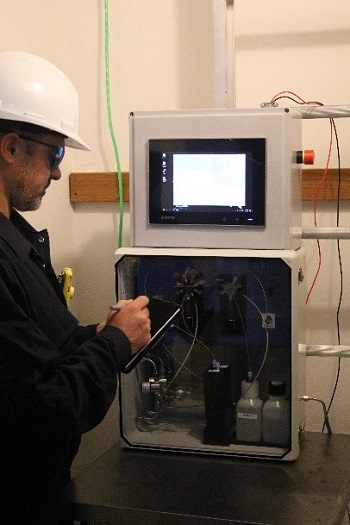Superfund Research Program
January 2021

OndaVia trained a team of experts to run its water analysis system at the NIH campus.
(Photo courtesy of Mark Peterman)
NIEHS Superfund Research Program (SRP) small business grantee OndaVia, Inc. successfully implemented their water analysis system at the NIH campus in Bethesda, Maryland. The system uses spectroscopy and nanotechnology to provide instrumentation for rapid, on-site, easy to use, and inexpensive laboratory-grade testing of chemicals in water.
The system installed at the NIH campus is fully automated and is designed to measure the concentration of the amine cyclohexylamine (CHA), which is used at a low-level to control corrosion in boiler water systems. CHA is listed as an extremely hazardous substance and can be toxic to humans if inhaled or ingested above regulatory safety limits.
“This requirement that the amine needs to be present in a tight range makes automated testing essential,” said OndaVia’s CEO, Mark Peterman.
The system provides semi-continuous measurement of CHA in a boiler water system at three sampling points. In each sampling point the system takes a water sample, adds OndaVia’s proprietary reagents, and then measures CHA concentrations in the resulting mixture. This technology provides on-site measurements needed for an immediate response.
“Prior to the development of our system, the only approaches for measurement were complicated and expensive tools that determine the total amine content, not specific amines like CHA,” said Peterman. “Our technology, which is highly specific and sensitive, overcomes these limitations.”
The water analysis system is successfully running at the NIH campus, and a team has been trained to implement it. OndaVia is currently working to increase the number of analytes the technology can measure and to expand the number of samples the system can handle.
OndaVia’s core technology was initially conceived in 2009 and progressed through early development with funding from an SRP Small Business Innovation Research grant. The team is currently working on an SRP-funded project to measure selenium in wastewater from coal-fired power plants to protect drinking water sources. This project includes creating test kits to monitor selenium in wastewater in real time and developing their technology into an online platform that will be accessible for commercial use.


